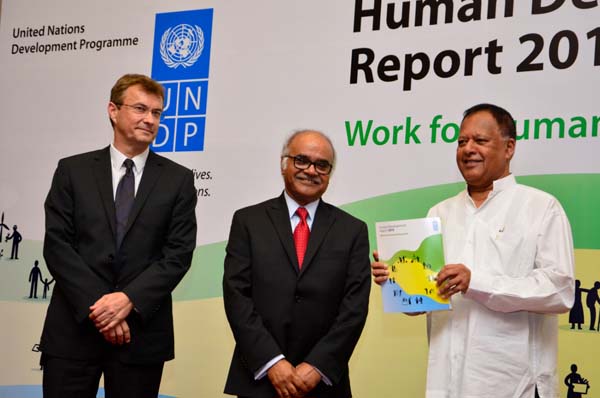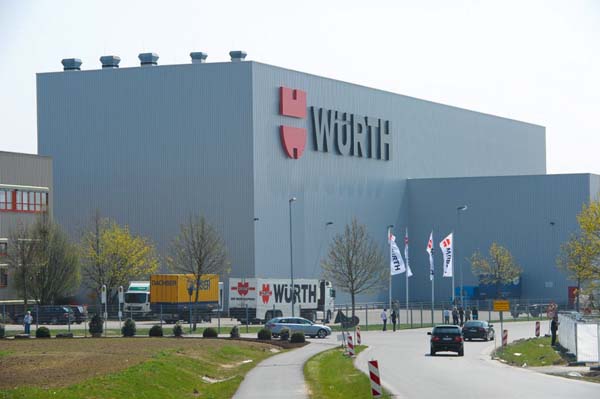
UNDP Launches the Global Human Development Report 2015 in Sri Lanka ‘Work for Human Development’
UNDP officially launched the Global Human Development Report (HDR) 2015 at an event held at the
Bandaranaike Memorial International Conference Hall today. Titled ‘Work for Human Development’ the report, taking a broader view of work,
examines links between work and human development and explores changes between job security, flexibility and demand for skills as well as
issues of paid and unpaid work, including care, voluntary, creative and sustainable work. In order to strengthen positive links between work and
human development, the report recommends policies that expand productive, remunerative, satisfying and quality work, that protect workers and
their rights and create work opportunities both for present and future generations.
Human development – or the human development approach – is about expanding the richness of human life, rather than simply the richness of
the economy in which human beings live. It is an approach that is focused on people and their opportunities and choices.
The Human Development Index (HDI) is a measurement that assesses long-term progress in three basic dimensions of human development:
a long and healthy life, access to knowledge and a decent standard of living. Accordingly, South Asia´s HDI value of 0.607 is below the average value
of 0.666 for the developing world. – Sri Lanka’s HDI value for 2014 however is 0.757— which places the country in the high human development
category— ranking the country at 73 out of 188 countries and territories.
Welcoming the gathering at the event, UNDP Resident Representative, a.i, Mr. Joern Soerensen noted the significance of this report stating,
“this new world of work presents great opportunities for some, but also profound challenges for others. The Report, we are launching today in Sri Lanka,
urges governments to act now to ensure no one is left behind.”
The report comes at a pertinent time in Sri Lanka’s own socio economic landscape as a middle income country where the significance of equitable
and decent work is a prevalent topic. The 2015 HDR is of special significance to Sri Lanka as His Excellency the President contributed a special feature
on ‘Community Participation for Improving Rural Livelihoods’ with regard to sustainable rural agriculture in the Sri Lankan Economy.
Speaking on behalf of H.E President Maithripala Sirisena, Chief Guest Hon. Dr. Sarath Amunugama, Minister of Special Assignments congratulated UNDP on
celebrating 50 years in development adding that, “the Government of Sri Lanka looks forward to continuing this journey together in enriching human lives
and developing a prosperous Sri Lanka for all.”
Delivering the key note address, Director of UNDP’s Human Development Report Office and Lead Author of the report Dr. Selim Jahan stated
“We are moving towards an increasingly polarized world of work. Enhancing human development through work requires holistic policy interventions
so everyone who wants to work has equal opportunities.”
This was followed by a high level panel discussion chaired by Mr. Thangavel Palanivel, Chief Economist for Asia-Pacific, UNDP Regional Bureau for
Asia and the Pacific alongside Dr. Ramani Gunatilaka, Director, Centre for Poverty Analysis, Dr. Azfar Khan, Head of Knowledge Research and Policy Building
and Senior Migration Policy Specialist, International Labour Organisation and Mr. Anushka Wijesinha, Chief Economist, Ceylon Chamber of Commerce.
The panel discussion provided an insight into key thematic areas relevant to work and human development.
**Ends**
Note to the Editor:
The Human Development Index (HDI) is a summary measure for assessing long-term progress in three basic dimensions of human development: a long and healthy life, access to knowledge and a decent standard of living.
Sri Lanka’s HDI value for 2014 is 0.757— which put the country in the high human development category— positioning it at 73 out of 188 countries and territories. Between 1980 and 2014, Sri Lanka’s HDI value increased from 0.571 to 0.757, an increase of 32.5 percent or an average annual increase of about 0.83 percent.
Sri Lanka’s 2014 HDI of 0.757 is above the average of 0.744 for countries in the high human development group and above the average of 0.607 for countries in South Asia. From South Asia, countries which are close to Sri Lanka in 2014 HDI rank and to some extent in population size are Pakistan and India, which have HDIs ranked 147 and 130 respectively.
In the 2014 HDR, HDRO introduced a new measure, the Gender Development Index (GDI), based on the sex-disaggregated Human Development Index, defined as a ratio of the female to the male HDI. The GDI measures gender inequalities in achievement in three basic dimensions of human development: health (measured by female and male life expectancy at birth), education (measured by female and male expected years of schooling for children and mean years for adults aged 25 years and older); and command over economic resources (measured by female and male estimated GNI per capita). The 2014 female HDI value for Sri Lanka is 0.730 in contrast with 0.769 for males, resulting in a GDI value of 0.948. In comparison, GDI values for Pakistan and India are 0.726 and 0.795 respectively.


